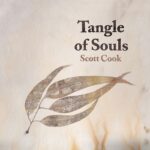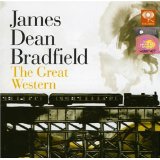 The last album from Scott Cook to hit my inbox was 2016’s “Go Long”, which shone a beam on the more light-hearted side of Scott’s songwriting. He described it as ‘a bunch of silly songs’, which didn’t entirely do it justice, because it had its serious moments and it was actually a great bunch of songs, whatever the flavour. “Tangle of Souls” is a very different proposition; it was written following a brush with the reaper and reflects the re-evaluation following that experience as well as other, happier, life events. Also, Scott Cook’s a philosopher and an idealist; it shouldn’t be surprising that there’s a sprinkling of social comment on the album as well. There are a lot of targets out there in 2020 and Scott firmly sets his sights on quite a few of them.
The last album from Scott Cook to hit my inbox was 2016’s “Go Long”, which shone a beam on the more light-hearted side of Scott’s songwriting. He described it as ‘a bunch of silly songs’, which didn’t entirely do it justice, because it had its serious moments and it was actually a great bunch of songs, whatever the flavour. “Tangle of Souls” is a very different proposition; it was written following a brush with the reaper and reflects the re-evaluation following that experience as well as other, happier, life events. Also, Scott Cook’s a philosopher and an idealist; it shouldn’t be surprising that there’s a sprinkling of social comment on the album as well. There are a lot of targets out there in 2020 and Scott firmly sets his sights on quite a few of them.
Let’s just take a step away from this particular album for the moment to look at albums in general. There’s a school of thought that the album is dead (particularly in CD form) and that a series of singles is the best way to capitalise on your work. Which might work if you rely on streaming or downloads for income; for artists who tour a lot in smaller venues an album or EP to sell at the merch desk is a great way to generate income without the hassle of distribution. What Scott has done with this album (and, to a lesser extent 2017’s “Further Down the Line”) is to go back to an earlier time when the music was only part of the album-buying experience. If you’re of a certain vintage, you’ll remember buying the album and checking out the artwork, credits, sleeve notes and lyric sheets, probably on the bus home. It built up the anticipation before you got the chance to play the album. What Scott’s done with “Tangle of Souls” takes this a few stages further. The album includes a two hundred and forty-page booklet which includes credits, lyrics, chords for the songs, the inspiration behind, and explanation of the songs and some of Scott’s biographical, historical and philosophical writings. It’s even printed on specialist paper with hand-drawn artwork. That’s got to be better than a thumbnail of the artist as you listen to a stream or a download (and yes, I did read all of it, it would have been rude not to).
So to the songs. There are twelve of them and each one of them is memorable, and several of them, for me, are classics. “Just Enough Empties” contrasts a gentler, not-too-distant past, with a lonely and alienated present through one person’s journey down a road of innocence, awakening, degradation and redemption linked by the practical idea of glass bottle recycling; it’s a beautifully-crafted song. “Say Can You See”, with the obvious reference to the “Star-Spangled Banner” in the title, is built around a string band arrangement and is Scott’s most overtly political song so far. It’s political, but in a non-partisan way; the message is that virtually everyone on the Hill (Republican or Democrat) is the enemy of the working people and that draining the swamp should actually flush away all of them (‘It ain’t about right and left, it’s about right and wrong’). Those two songs alone would make this a five-star album for me, but there’s even more.
“Passin’ Through” was written by Dick Blakeslee in the forties and it’s one of those songs that lends itself to verses being changed or added. The narrative structure could have inspired the Stones’ “Sympathy for the Devil”; Jagger says it was something from Rabelais, but he would say that, wouldn’t he? Scott adds his own verse to the song with a tribute to Victor Jara, the Chilean activist beaten and executed by Pinochet’s thugs in the Santiago Estadio Nacional in 1973. This song attracted my attention even more because, coincidentally, the Manic Street Preachers’ James Dean Bradfield has recently released an entire album dedicated to Victor Jara (“Even in Exile”). It’s worth checking that out as well.
The last of my personal picks is “What to Keep”, a slow piece that interweaves the personal and political in an exploration of the physical and mental baggage that we carry with us as individuals or as nations. The message is that there are always things that weigh us down that we should cut loose to lighten our load, whether it’s personal memorabilia or inappropriate public commemorations of bygone eras; the less you carry, the easier it is to move forward. The remaining seven songs and one instrumental are all superbly crafted and delivered, and packed with interesting and thought-provoking ideas, but I’d like you to listen to some of the album without the dubious benefit of my opinion.
“Tangle of Souls” is an important work from the wider Americana scene this year. It’s a deeply-considered view of individuals and society twenty years into the twenty-first century; the narratives aren’t necessarily cheerful, but the overall message is positive, in line with Scott’s personal outlook after some challenging times (which you can read about in the book).
“Tangle of Souls” is released in the UK on Friday October 9th.
 Just in case anyone hadn’t realised, I’ve loved the Manics almost from day one. From the first time I heard “Slash ‘n’ Burn”, I was hooked and I’ve never heard anything since that came remotely close to unhooking me. I loved the Richey-period Manics because of Richey’s lyrics and James’s voice, playing and ability to write a memorable tune and I didn’t skip a beat when Nicky Wire took over as main lyricist for the band. He’s a gifted writer and he has an opinion or two; I like that.
Just in case anyone hadn’t realised, I’ve loved the Manics almost from day one. From the first time I heard “Slash ‘n’ Burn”, I was hooked and I’ve never heard anything since that came remotely close to unhooking me. I loved the Richey-period Manics because of Richey’s lyrics and James’s voice, playing and ability to write a memorable tune and I didn’t skip a beat when Nicky Wire took over as main lyricist for the band. He’s a gifted writer and he has an opinion or two; I like that.
So, in 2006, when James Dean Bradfield released his solo album “The Great Western”, I couldn’t wait to get my hands on a copy. I loved it the album the first time I listened to it and I still love it every time I listen to it. The highest chart position it reached (with minimal promotion) was 22, and that puts it firmly in Closet Classic territory. Oh, and my favourite mondegreen is on this album, but I’ll tell you about that later.
So why would a songwriter in a commercially successfully and critically-acclaimed band want to release a solo album? Well, the Manics have always been big on the manifesto songs but, with a few exceptions (including “Life Becoming a Landslide” and “Ocean Spray”), they’ve not really done the personal, apolitical and introspective thing. If you’re a songwriter as prolific as James, you’re always going to have a bunch of great songs that just won’t work on any band album. When you listen to “The Great Western”, you realise that it would be criminal not to get these songs out there.
I love an album that opens with a big guitar riff and “The Great Western” certainly ticks that box; throw in some handclaps as well on the intro to “That’s No Way to Tell a Lie” and you’ve got my attention from the first four bars (it was even used on “Match of the Day”, so full marks to that BBC researcher). The production on the album is generally Spectoresque wall-of-sound, with the exception of the beautiful minimalist acoustic Jacques Brel cover “To See a Friend in Tears” and the final song “Which Way to Kyffin” which references Laurie Anderson’s “O Superman”, and James has great fun with all of the melodic invention, layers of acoustic and electric guitars and completely over-the-top backing vocals that you would never hear on a Manics record (ok, maybe on “Everything Must Go”).
Lyrically, the album generally looks backwards to the early days of the Manics, life in the valleys in the 1980s and moving away from that life. “An English Gentleman” is a tribute to the band’s first publicist, Philip Hall, “Say Hello to The Pope” and “Bad Boys and Painkillers” (the only song on the album co-written with Nicky Wire) look back to life in Blackwood, and “Emigré” deals with the conflict created by leaving your roots to pursue your dreams. “Still a Long Way to Go” sounds a lot like a prequel to the highly personal “Ocean Spray” and “Run Romeo Run” has a chorus to rival anything that made it on to a Manics record.
Anyone with a pair of ears knows that James Dean Bradfield can write a great tune (and you can ask Shirley Bassey about that) but “The Great Western” proves that he’s a gifted lyricist and a talented producer as well. Seven years after I bought this album, I still love to listen to it and I’m convinced that James had a huge amount of fun putting the whole thing together. I suspect it was bought almost exclusively by Manics fans and that’s a bit of a shame really because this is a superb bunch of songs and it’s eclectic, well-crafted, well-performed and well-produced.
And what about that mondegreen? After hearing “On Saturday Morning We will Rule the World” many, many times I was still confused by a line that I heard as “A book of Brie and a telephone” until I finally realised that it was “A Ford Capri and a telephone”, which is ironic given that I’ve spent the last ten years living as an emigré a couple of miles from the old Ford complex in Dagenham.
Even if you’re not a fan of the Manic Street Preachers, put your prejudices to one side and listen to an album that absolutely fizzes with emotion and musical and lyrical invention. What more could you possibly want?


